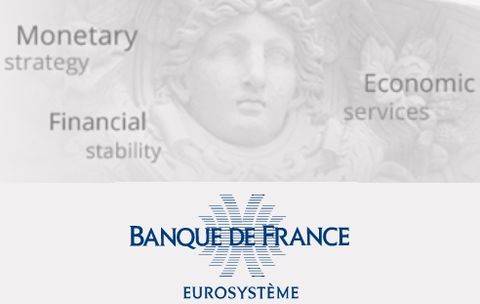Companies news • Publications
Banque de France : latest news

Please find some selected news from Banque de France’s office in Singapore:
Digital innovation: what role can we play as central banks? – Singapore Fintech Festival – 8 November 2021, Speech by François Villeroy de Galhau, Governor of the Banque de France
We are more associated with stability than disruption… Yet the blossoming of digital innovation has the potential to transform the financial system in its entirety. We have to embrace these changes, but there are also things that we need to preserve in this process: the stability of the financial system.
Innovation and stability can appear as contradictory in the short run; but they are complementary through a common value; a keystone: trust. Trust of the public in money.
No corner of the financial system is left untouched by digital technologies, a look at the agenda of this Fintech Festival tells it all: payments, decentralized finance and open banking, crypto-assets, central bank digital currency, quantum computing, etc… These technologies bring competitive pressure and such innovative pressure is healthy: it challenges inefficiencies, helps improving services, brings down costs. Fintechs are key players in the modernisation of the financial sector and I expect banks in particular to seize more systematically the opportunity to participate to this transformation.
Digital innovation: what role can we play as central banks?
How to ensure the good functioning of our payment system in the digital age? – France Payments Forum – 9 November 2021, Speech by Denis Beau, First Deputy Governor of Banque de France
The landscape of payments and market infrastructures is undergoing a transformation as a result of the changing payment expectations and habits associated with the digitalisation of our economies, the implementation of new technologies such as distributed ledger, the emergence of new players such as fintechs and bigtechs, and the increasing use of new settlement assets such as crypto-assets.
The health crisis and the resulting social distancing have contributed to accelerating these changes. For a central bank such as the Banque de France, which is responsible for ensuring the smooth functioning of our payment system, this acceleration has made it all the more necessary for us to be vigilant with regard to the attendant opportunities and risks.
In order to address the increase in these risks, the Banque de France is working on three complementary areas: regulation, facilitation and experimentation.
How to ensure the good functioning of our payment system in the digital age?
A press release on The Banque de France publishes a report on its experiments with wholesale Central Bank Digital Currency (CBDC), conducted in 2020 and 2021
The tests focused on ways of integrating a CBDC into innovative procedures for the exchange and settlement of financial assets, based on new technologies such as Distributed Ledger Technology (DLT), and in a multi-currency and cross-border setting.
The report covers nine experiments, selected from close to 40 proposals, which were conducted as of September 2020 in conjunction with domestic and international private sector players, as well as other central banks and public authorities. Numerous technological partners were also involved, enabling the experiments to explore a broad range of technologies.
The report can be found here
An article on Worldwide GDP decline in 2020: the relative impact of health restrictions, the responsiveness of public and private economic agents, and sectoral specialization
The intensity of the pandemic (as measured by the number of people infected with the virus or dying from the disease) explains only a small share of the shock to GDP in the major economies in 2020. Half of the shock can be attributed to the scale of the response of both government authorities in terms of health restrictions and private economic agents. The other half can be explained by sectoral specialisation (mainly tourism, level of technological development), the pre‑crisis demographic, social and economic situation and the impact of the fiscal stimulus introduced in 2020. In countries where a “managed quarantine” strategy was adopted, with the aim of strictly containing the pandemic rather than “living with it”, the fall in GDP appears to have been less pronounced.
A working paper on Overview and inventory of french funds' liquidity management tools: Dynamic view since 2017 and update as at mid-2021
This article presents an update of the analysis of French-domiciled funds’ prospectuses carried out jointly by the Autorité des marchés financiers and the Banque de France (Darpeix, LeMoign, Même, Novakovic, 2020). The first contribution of this new study is to bring a time dimension to the study of the deployment of liquidity management tools (LMTs) in investment funds since the implementation of the recommendations of the Financial Stability Board (2017) and of the International Organization of Securities Commissions (2018). These tools, introduced into the French regulatory framework, are a response to the financial stability issues that have been identified concerning liquidity in investment funds around the world. The second contribution of this article is to allow for a granular assessment of LMTs’ uptake, by fund type and according to various fund characteristics (funds serving as units for unit-linked insurance products, employee savings funds, ETFs, regulatory nature - UCITS or AIFs-) via merges with other databases.
The main result from this article is that even if a progression of the deployment is indeed observed in certain categories of funds, there is still to this day a significant margin of improvement for the liquidity management tools to become a market standard for French investment funds.
A working paper on Debt-Stabilizing Properties of GDP-Linked Securities: A Macro-Finance Perspective
(…) Do GDP-linked bonds remain a relevant tool for the stabilization of debt once accounting for a wider set of determinants?
In this paper, we address this question by extending the representation of the debt-to-GDP process to allow for the issuance of any type of bond (conventional or GDP-linked) with any maturity. This generalization features several drivers of the debt-to-GDP process and notably requires information on the price dynamics of GDP-linked bonds, which is not directly observable given no large developed economy has ever issued them. To this end, we estimate an asset-pricing model that exploits observed macroeconomic and financial data that are informative about the pricing of GDP-linked bonds.
We study the debt-stabilizing properties of indexing debt to GDP using a consumption-based macro-finance model. Three results stand out. First, GDP-linked bond prices would embed sizeable and timevarying risk premiums of about 40 basis points. Second, for a fixed budget surplus, issuing GDP-linked securities does not necessarily imply more beneficial debt-to-GDP ratios in the medium- to long-run. Third, the debt-stabilizing budget surplus is more predictable under such issuances at the expense of being higher on average. Our findings call into question the view that GDP-linked securities tame debt.
Debt-Stabilizing Properties of GDP-Linked Securities: A Macro-Finance Perspective
A NGFS publication on Climate-related litigation: raising awareness about a growing source of risk
Understanding the risks arising from climate-related litigation is also crucial for central banks and supervisory authorities, as the financial implications of such cases can be substantial. The purpose of this document, based on work conducted this year by the NGFS Legal Task Force on climate-related litigation, is to raise attention to the risks ensuing from climate-related litigation, as they are relevant for microprudential supervision and for the monitoring of financial stability. The document outlines general trends in climate-related litigation and proposes ways of addressing these risks. It has a section on climate-related litigation risk as a sub-category of physical and transition risks and also briefly discusses the direct exposure of financial institutions to climate-related litigation. It includes an overview of selected cases as well as the results of a survey that was conducted amongst NGFS members to gather information from the respective jurisdictions about climate-related litigation.
Climate-related litigation: raising awareness about a growing source of risk
A press release on The Central Bank of Malta joins MAPS, the Treasury Management System designed by and for central banks
MAPS is the Treasury Management System for Central Banks provided by Banque de France and Banco de España. MAPS manages a wide range of financial instruments, spanning front and back-office, risk management, accounting and financial reporting functions. It comprises a technical platform and tailor-made solutions to cope with central banks’ business needs. MAPS as a global offer provides a preconfigured solution based on Calypso software and a full set of hosting and running services as well as implementation, training and migration services for new joiners.


